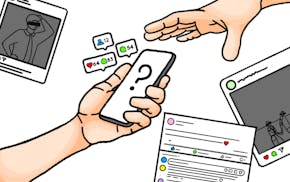Opinion editor's note: Strib Voices publishes a mix of guest commentaries online and in print each day. To contribute, click here.
•••
When should I give my kid a smartphone?
This is a multibillion-dollar question, considering 95% of U.S. teens ages 13 to 17 now own a smartphone. While there is no definitive answer, what I can share are a few things I learned from my own and others' research that I wish I had known years ago.
First, unlimited screen time is a "digital drug" and has real consequences on our kids' health. Brain-imaging research has shown that extensive screen exposure, like six weeks of heavy video game playing, can alter (or, more precisely, damage) the brain, in similar ways to those seen in drug addiction. In fact, a glowing screen is so powerful that researchers experimented with a virtual-reality video game to help burn victims with pain management and found the effects were comparable to morphine, a real drug.
As parents, we are too familiar with the recent surge in cognitive and mental disorders like ADHD, anxiety, autism, depression, aggression and even psychosis. Clinical evidence has linked these with screen exposure. Phone use has been shown to negatively affect academic performance, with socially disadvantaged kids more adversely affected.
Second, mere screen exposure can cause harm regardless of content. Dr. Victoria L. Dunckley, author of "Reset Your Child's Brain," suspects screen exposure is an underlying cause of many disorders. Flashing screens trigger fight-or-flight reactions and overstimulate a developing brain, putting it under chronic stress. It can cause biological changes like directing blood to the "animal" brain and away from the "human" brain. As parents, we often think interactive screen time is better than passive screen time. It turns out interactive screen time causes more harm because it creates greater hyperarousal and dysregulation.
Third, there is convincing evidence that exposure to media violence leads to aggression and desensitization to violence, particularly in children. According to Dr. Nicholas Kardaras, author of "Glow Kids," violent video gaming is associated with poor school performance, increased aggression and decreased empathy. While most kids, thankfully, won't commit actual violence, they are more likely to engage in "daily aggressions," saying or doing things insensitive to others' feelings. As the mother of a middle school student, I hear about it on a regular basis.
Now that we are aware of the potential harm of screen exposure, what can we do? First and foremost, do not blame your kid, and do not blame yourself as a parent. Behind the screens are big tech companies and their top talents who use everything we know about human psychology and the most advanced algorithms to have our kids engaged (more precisely, hooked) on these glowing devices. It has not been a fair fight.
A social problem requires a social solution, which is why I decided to write this commentary to raise awareness. Several things have helped me as a mother.
The first is a tech reset, especially if you feel screens have turned your used-to-be-sweet kids into little monsters when you try to take away their devices. You will be amazed at how big a difference it can make.
The second is parenting 101: Do as you preach. When we are mindful of our interactions with phones, we provide better attention to our kids and are better role models.
The third is to allow our kids to be bored. In my research, boredom was named as the No. 1 trigger of phone use. According to Kardaras, learning to deal with boredom is "the most developmentally … important skill" for kids. Compared to the screen world, where exciting things happen all the time, the real world is dull and boring. Being able to live with ordinary moments and appreciate them is key to a happy life.
Back to the opening question of when to give kids a smartphone: In my house the answer is "not until high school," because I observed anecdotally in my research that kids who received a smartphone after starting high school tended to have a healthier relationship with it. In contrast, middle schoolers have few productive needs for a smartphone, meaning they often use it to waste time.
What about the common refrain, "All my friends have one, why can't I?" My answer is that many people doing the same thing does not mean it is good or wise. What is common is not necessarily normal or beneficial.
Yuqing Ren is a faculty member at the Carlson School of Management at the University of Minnesota. The views expressed in the commentary are hers, not those of the university or the Carlson School.

Rash: At home, Jake Sullivan reflects on events abroad

Opinion: Let's not lose sight of what's best for older adults

Readers Write: Minneapolis politics, Trump's budget, hot tub rentals

